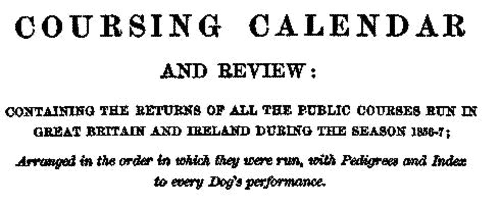Culy Surname Ancestry ResultsOur indexes 1000-1999 include entries for the spelling 'culy'. In the period you have requested, we have the following 18 records (displaying 11 to 18): Single Surname Subscription | | | Buying all 18 results of this search individually would cost £102.00. But you can have free access to all 18 records for a year, to view, to save and print, for £100. Save £2.00. More... |
These sample scans are from the original record. You will get scans of the full pages or articles where the surname you searched for has been found. Your web browser may prevent the sample windows from opening; in this case please change your browser settings to allow pop-up windows from this site. Hare Coursing Competitors at March in Cambridgeshire (1856)
Names of competitors from results recorded in the Coursing Calendar for September to December 1856; in which the meetings are listed chronologically, giving precise dates and the names of the presiding officers (stewards, judge, slipper, field officer, secretary). In each heat two greyhounds are raced, the winner from each pair proceeding to the next heat. Each dog is identified by its name and that of its owner. The parents of the winning dog are usually stated. The name of each competition is given with the number of nominations, the stakes and prizes. There are also occasional matches between particular dogs. These abbreviations are used: b. bitch; bd. brindled; be. blue; bk. black; br. l. broken leg; cr. cream; d. dog; dn. dun; dr. (with)drawn; dr. l. drawn lame; f. fawn; gr. grey; p. puppy; r. red; t. ticked; tn. tanned; w. white.
CULY. Cost: £8.00.  | Sample scan, click to enlarge

|  Persons of standing recommending London police recruits
(1843-1857) Persons of standing recommending London police recruits
(1843-1857)
The Metropolitan Police Register of Joiners (MEPO 4/334) lists policemen joining the force 1 January 1843 to 1 April 1857 (warrant numbers 19893 to 35804). The register is alphabetical, in so far as the recruits are listed chronologically grouped under first letter of surname. It gives Date of Appointment, Name, Number of Warrant, Cause of Removal from Force (resigned, dismissed, promoted or died), and Date of Removal. Although the register was closed for new entrants at the end of 1842, the details of removals were always recorded, some being twenty or more years later. Those recruits not formerly in the police, the army, or some government department, were required to provide (normally) at least two letters of recommendation from persons of standing, and details of these are entered on the facing pages. Where a recruit was only recently arrived in the metropolis, the names and addresses of the recommenders can be invaluable for tracing where he came from. Those recruits not formerly in the police, the army, or some government department, were required to provide (normally) at least two letters of recommendation from persons of standing, and details of these are entered on the facing pages: the names in these are indexed here (the police recruits are indexed separately and not included here). Recruits transferred from other forces or rejoining the force did not normally need recommendations - in the latter case, former warrant numbers are given - but some recommendations are from police inspectors, even other constables. Recruits coming from the army sometimes have general military certificates of good conduct, but most often have a letter from their former commanding officer; recruits recommended by government departments (most often the Home Office) similarly have letters from the head of department. But the great majority of the names and addresses in these pages are of respectable citizens having some sort of personal acquaintance with the recruit. Where more than two recommendations were provided, the clerk would only record one or two, with the words 'and others'. Tradesmen are sometimes identified as such by their occupations; there are some gentry. Although the bulk of these names are from London and the home counties, a scattering are from further afield throughout Britain and Ireland. CULY. Cost: £8.00.  | Sample scan, click to enlarge

| Debtors
(1880)
Bills of sale (binding assets to a creditor/lender) in England and Wales, October to December 1880CULY. Cost: £6.00.  | Sample scan, click to enlarge

| Debtors
(1881)
County Court Judgments in England and WalesCULY. Cost: £6.00.  | Sample scan, click to enlarge

| Debtors, Insolvents and Bankrupts
(1881)
Bills of sale (binding assets to a creditor/lender), insolvencies and bankruptcies in England and Wales, July to September 1881CULY. Cost: £6.00.  | Sample scan, click to enlarge

| Debtors, Insolvents and Bankrupts
(1881)
Bills of sale (binding assets to a creditor/lender), insolvencies and bankruptcies in England and Wales, April to June 1881CULY. Cost: £6.00.  | Sample scan, click to enlarge

| County Court Judgments: Norfolk
(1890)
Extracts from the Registry of County Courts' Judgments. These judgments were not necessarily for debt. In some cases they were for damages on properly disputed causes of action, but no distinction was made on the Register. Judgments settled otherwise than through the Court may appear, unless 'Satisfaction' was entered up within the fourteen days allowed for that purpose. These printed extracts include occasional notes giving more detail about certain cases, and also list Satisfactions entered on the Register.CULY. Cost: £6.00.  | Sample scan, click to enlarge

| Estates of the Deceased: Notices under the Trustee Act
(1950)
Under the Trustee Act 1925 s. 27, notices were gazetted giving the names of deceased (surname first, in capitals); address, description, and date of death; names, addresses and occupations of persons to whom notices of claims against the estate were to be given, and names (in brackets) of personal representatives; and the date on or before which notices of claim were to be given. April 1950.CULY. Cost: £4.00.  | Sample scan, click to enlarge

|
 | 1 | 2 |
Research your ancestry, family history, genealogy and one-name study by direct access to original records and archives indexed by surname.
|











